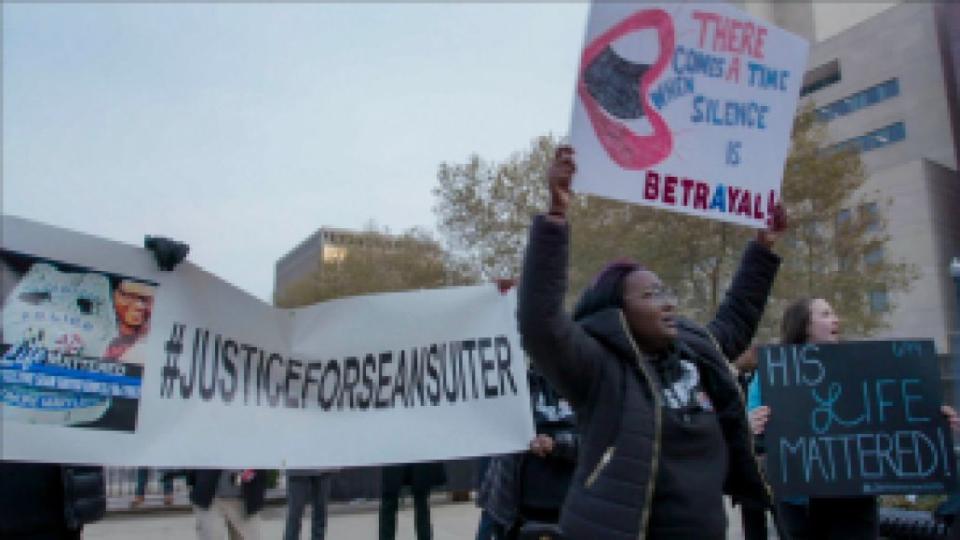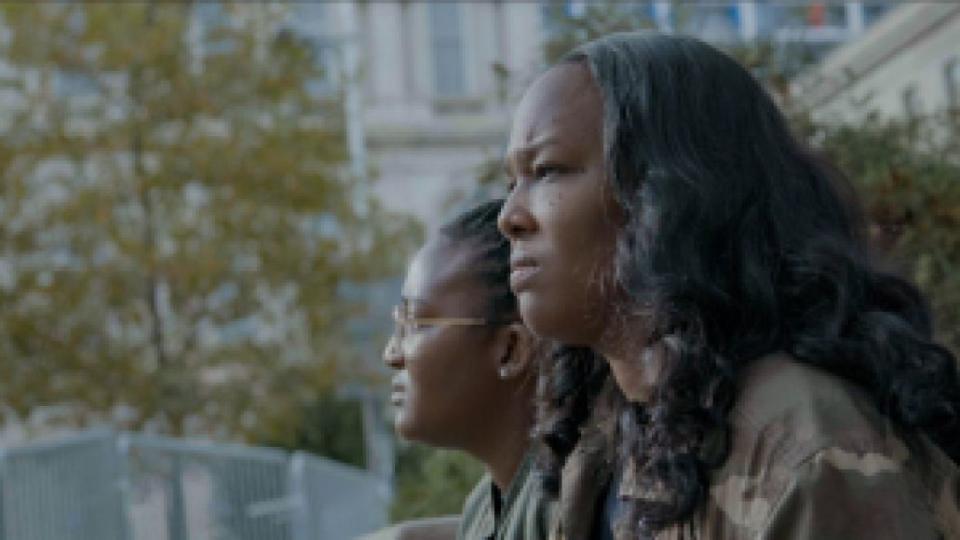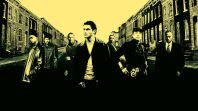The Wire Star Sonja Sohn on Wanting to Give Back to Baltimore With Her New HBO Documentary The Slow Hustle
- Oops!Something went wrong.Please try again later.
- Oops!Something went wrong.Please try again later.
The post The Wire Star Sonja Sohn on Wanting to Give Back to Baltimore With Her New HBO Documentary The Slow Hustle appeared first on Consequence.
The Slow Hustle is a story about corruption and a story about persistence. The HBO documentary, directed by Sonja Sohn, is technically focused on the unsolved murder of Baltimore police detective Sean Suiter. But the story that emerges is a portrait of a police force so weighed down by corruption and other issues that it’s incapable of finding the truth behind what happened to one of its own — raising the question of what function the police serves in our society.
The project is Sohn’s second documentary, following the 2017 film Baltimore Rising, which she directed after spending time in Baltimore after the uprising that occurred after Freddie Gray’s death — though it hadn’t originally been her idea to direct that film.
Instead, after getting to know some of the activists involved in the uprising, she alerted producer Marc Levin to the potential of doing a documentary about the unrest, and he encouraged her to take it on herself. “I didn’t expect that Marc would suggest that I direct it, and that HBO would give me the opportunity to do so, based on his word and [Baltimore Rising producer] Anthony Hemingway and all of them. So yeah, I’m just really grateful,” she says.
Sohn, of course, had a relationship with HBO prior to this as a series regular on The Wire, playing Baltimore police detective Kima Greggs — while she stepped back from acting in recent years to focus on activism, she’s made recent appearances on shows including The Chi and Star Trek: Discovery.
As she tells Consequence in this one-on-one Zoom interview, edited and condensed for clarity, she’s at a bit of a crossroads right now when it comes to her career, but she’s very passionate about using this documentary as a way to contribute to the conversations America is having now about law enforcement in our society.
Before you made Baltimore Rising, was making documentaries something you had ever thought you might try to do at some point?
No, not at all.
So it was really inspired by the events of that time.
Oh, absolutely. Also, at the time I was trying to find a different way to give back. Baltimore had become a very big part of my life since 2008, when I discovered the power of what having a platform could do. There was sort of trying to have the career and spending a lot of time in Baltimore — that’s my chosen place. Like I feel like a soul home for me there.
So I had been in conversation with some folks about how to [be involved] more efficiently and where I could be more impactful, because the organization had moved into community-based events and works initiatives, and there were other organizations doing that work and doing it well. That’s another thing about advocacy and activism, it’s like, how to serve, you know? And so that’s how [Baltimore Rising] came about — it was like, wow, well, here’s how I can serve, I’m a bridge to possibly getting their story told.

Protest of Sean Suiter’s death, photo courtesy of HBO
What was your reaction to first hearing, “Oh, you should direct this?”
I was alarmed and also excited. Mark was so sure that I could do it because he said he had mentored a few directors through their first films, and he sort of broke it down to me.
It just all clicked — I have written before, and being an actor, I know story and character and all of that, which is very applicable here. It just all clicked in one moment. It was like, well, if no one’s gonna do it and that’s gonna get it done, then I will do it. I will figure it out along the way, but this has gotta get done.
So there was, like I said, alarm, but also a little bit of excitement. There was the advocate in me just kind of going, well, listen if it can get done, we gotta get it done. So at that point in time, I was more producer/advocate than director.
I learned a lot along the way — [Baltimore Rising] was a verité doc and [The Slow Hustle] had verité components to it, but it’s constructed and there were other elements. I think by the time I got into this documentary, that’s when I feel that I started to become a filmmaker.
Absolutely. So talk to me a little bit about what inspired you to take on Sean Suiter’s story?
The story was actually presented to me by an executive at HBO at the time — Kary Antholis asked if I thought there was something I could bring to this story, if there was an interest there.
I saw that there was a possibility for a documentary six months earlier, when Detective Suiter was shot and killed the night before the premiere of Baltimore Rising. But I had been just so impacted by the events that took place throughout the year and a half of shooting Baltimore Rising that the idea of going into a law enforcement story was not very enticing. [Laughs]
But six months later, when I was approached, I thought well, let me just see, is there something that I can bring to the table? Because by that time, the police corruption scandal had already broken. When I went back and met Nicole [Suiter] and the journalists, I felt that there were pieces missing and that what was happening here says something larger about society, about humanity, and about law enforcement.
Ranking: Every Season of The Wire from Worst to Best
What can happen when we don’t trust those who are supposed to be helping to monitor things in communities. And what’s the new structure? Because that if we’re…
I’m gonna leave it right there. I don’t want to say too much. At some point it ends up being a little bit of a shit-show. You’re going like, what’s the truth, where’s the truth? Who’s telling the truth? Do the people have it right? Do the cops have it? That is where we are now.
I think it speaks to the number of unsolved homicides. There’s just such a complex equation there happening, and I’m really about shaking up structures in general. And this is one institution that has a structure that could use a shake up and what that is, I don’t know. But presenting questions is always a good place to start.

Nicole Suiter, photo courtesy of HBO
When it comes to the way the documentary ends, how do you hope people walk away from this? How do you hope they interpret the ending?
The ending is really a question. Halfway through the making of the film, there emerged this question of not who killed Sean Suiter, but what killed Sean Suiter, and so that’s one layer. That’s one question I think that could be left with to explore.
But I just want to hearken back to this statement that I’ve been making, about being a society that, on some level, needs to debate the degree to which it needs to be monitored, protected, and served by a body of people, and how that needs to take place.
Because ultimately, if we get down to a place where we don’t trust their word on what happens in the communities that they serve, and we’re suspecting them of the crimes that they’re supposed to be solving and we’re suspecting them of crimes against us, and then their own people, that is a level of mass public betrayal that we are living in.
When it looks like you’ve done it to one of your own, that level of betrayal — it’s like, you’re betraying your own now… They’re a symbol. Whether you want them there or not, they’re a symbol of something in your consciousness.
So to me, it’s a bigger question because we are all figuring this out. If we can’t trust the police, then what does that mean? You know, for our sense of safety. And I think it’s something going on in our unconscious collective right now, and this is a microcosm of that. Not looking at it from a police brutality angle, but from the angle of wow, they couldn’t protect one of their own. And so just to have a philosophical conversation around that is interesting to me.
I don’t think that all documentaries need to wrap up in a bow. I don’t think they need to be happy. I’d like to see more that are actually more pointed in terms of leaving you somewhere. Like, hey, now what are you gonna do? How do you feel? Become a part of the conversation, engage with this, take it the next step. Maybe you are going to do the sequel.
Looking forward, what are you hoping to be doing? Do you want to keep working in documentary? Do you want to keep taking the occasional role as well?
Honestly, I love documentary. It’s become a real passion of mine for now. I’m just swinging from genre to genre, creatively and it’s very exciting — I just feel blessed to be in documentary. I feel like it brings my heart and soul, what I am and what I stand for.
What brings me joy is doing deep dives and learning, and I feel like documentary is a way to grow, also. I’m not out here doing documentaries about things that I absolutely 100 percent know about. I may be involved in the world or connected to the world in a visceral sense, but the point to me, for me…
I mean, there are different kinds of documentaries if you’re doing scientific type things, but for me, I love people, and I am made better, wiser by engaging in this art form, which is also a truth-telling form, which is also like a form of reflection. It’s like a meditation. It just has so many components to it. So it really engages, I think so many aspects of my being.
Now I love acting too — at this point in my career acting is taking a different form in my life, and I realized that to honor that art form, it’s really important that I just show up fully and choose wisely. Really, I’m in a pivot mode. You’re asking me a question right as I’m actually working that out. So let me not sit here and try to act like I’ve worked it out. That’s the answer [Laughs]
I’m not pivoting, but just figuring out a way to do it all. I’m doing some writing and somehow, just staying grounded, and well-fed and well-rested, and at peace. Somehow, it’s all going to work out.
Baltimore Rising premieres December 7th at 8:00 p.m. ET on HBO.
The Wire Star Sonja Sohn on Wanting to Give Back to Baltimore With Her New HBO Documentary The Slow Hustle
Liz Shannon Miller
Popular Posts
Sylvester Stallone Sparks QAnon Speculation with Coded Selfie
Machine Gun Kelly Tried Catching a Knife to Impress Megan Fox, Stabbed Himself
Fight Breaks Out During Three 6 Mafia and Bone Thugs-N-Harmony's Verzuz Battle
Dave Grohl Covers Van Halen's "Jump" with Greg Kurstin on Night Four of Hanukkah: Watch


